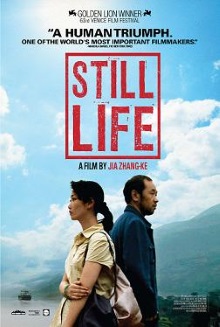
After a lot of searching, I finally managed to find this film that my wife wanted so long ago. By now this is the third film we’ve watched by director Jia Zhangke but it’s the oldest one yet. Once again, it stars Zhao Tao who I have since learned is married to the director himself. I note that the English title for this is very inappropriate. Not only does it bear no relation with the Chinese title but the usual meaning of the phrase seems different from what the director intends here.
A middle-aged man, Han Sanming, arrives in the city of Fengjie in search of his wife who left him sixteen years ago, taking their daughter with her. He doesn’t realize however that the city is due to be inundated due to the imminent completion of the Three Gorges Dam project and its citizens have been drifting away. Eventually he makes contact with his erstwhile brother in law who tells him that his sister has been working in another city and will be back in a month or two. So Sanming finds a job with a demolition crew and settles down to wait. Meanwhile Shen Hong has also arrived in search of her husband who she has not seen for two years. Her husband is a manager at a company that handles the demolition work and she suspects that he has made a new life in the city away from her.
The two stories are connected only in that they both take place in Fengjie and I have to say that Sanming’s tale of life among the laborers is much more compelling than that of Shen Hong. There’s an almost poetic quality to the images of the bare-chested workers totting sledgehammers as they bring down the condemned buildings wall by wall while all around them are vistas of the Yangtze River. This film feels rawer and more visceral than the director’s newer films and much of this can be attributed I think to Sanming’s coarse life. I suppose that Shen Hong’s story has something to say about the opportunities that the richer middle-class finds in the destruction of the city. One scene has her amidst a group that feels almost celebratory as they dance and drink wine atop a balcony that overlooks the city while someone shows off a bridge that soars above the river in its fully lit glory to his VIP investors, symbolizing perhaps the modern China to be built atop the ruins of the old. Still it feels like a distraction from the main story and it’s not a thread that really goes anywhere.
The sense that something will have been irrevocably lost when Fengjie is submerged beneath the water runs throughout the film. An obvious pointer is how Shen Hong’s friend is an archaeologist still working until the very end to unearth Han dynasty era ruins. I especially like this extends to the people who live there as we watch them disperse all over China, unraveling a distinct community. It is a nice twist of irony that Sanming’s gang of demolition workers tells him that they would like to find new in his home town after their work here is done. I’m less certain about the themes about the characters themselves. There is a clear parallel here with Mountains May Depart in that they are about connections between people long separated but I’m not certain if it goes any deeper than that. The message here is at least markedly different as it shows that people can indeed reconnect. There is also obviously something going on with the title cards saying “Cigarettes, “Liquor” but again, the reference escapes me. Then there are the weird shots of flying saucers and a flying building representing perhaps alien civilizations wanting a last look at the city. You’d expect this stuff in a Coen brothers film but the tone here doesn’t seem like the right match.
Even if I can’t completely grasp what this film is trying to say, I find that it is still my favorite of the three films by this director that we’ve watched so far. The less dramatic nature of the characters’ stories makes the visuals and the city itself stand out more, preventing the film from falling into clichéd sentimentalism. So far I’ve found that this appears to be the pattern across many Chinese films. They tend to be great when they take a wider view about society and the world but weak when they focus in close as an in-depth character study.